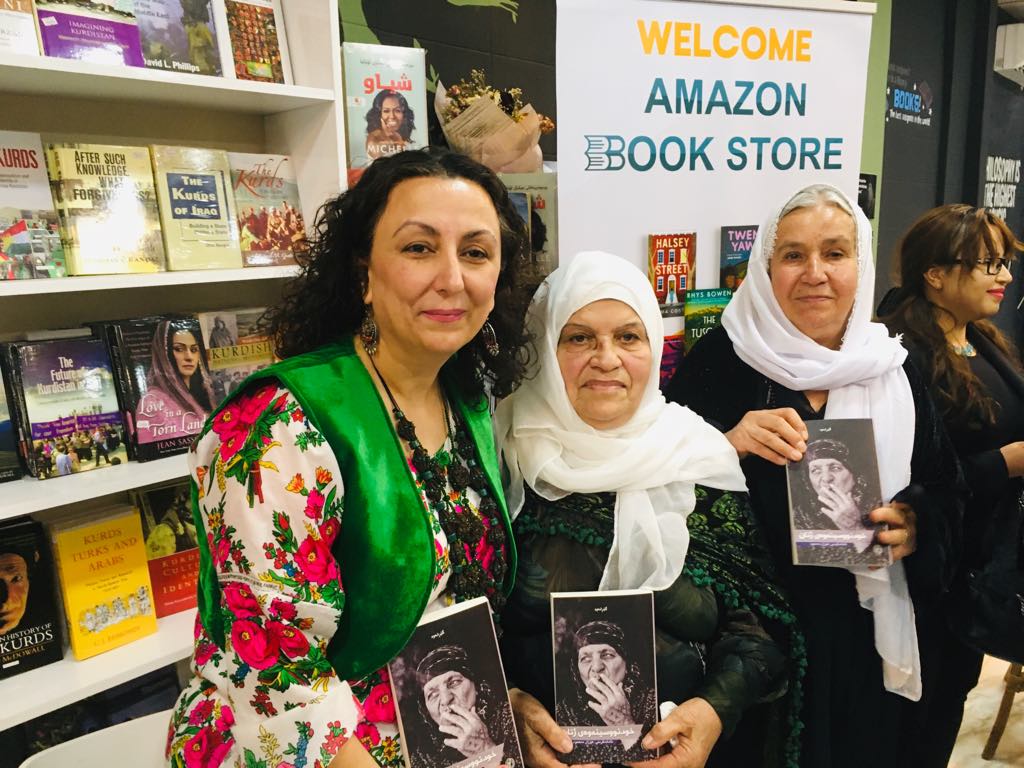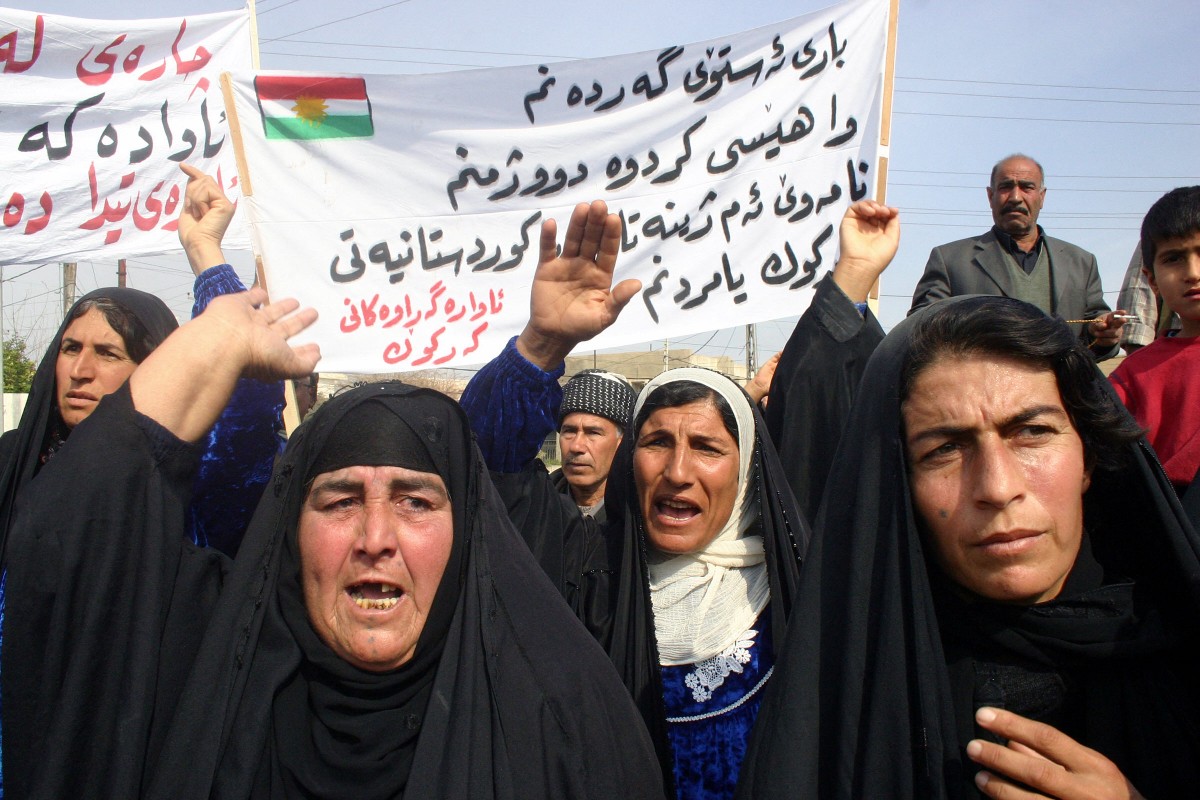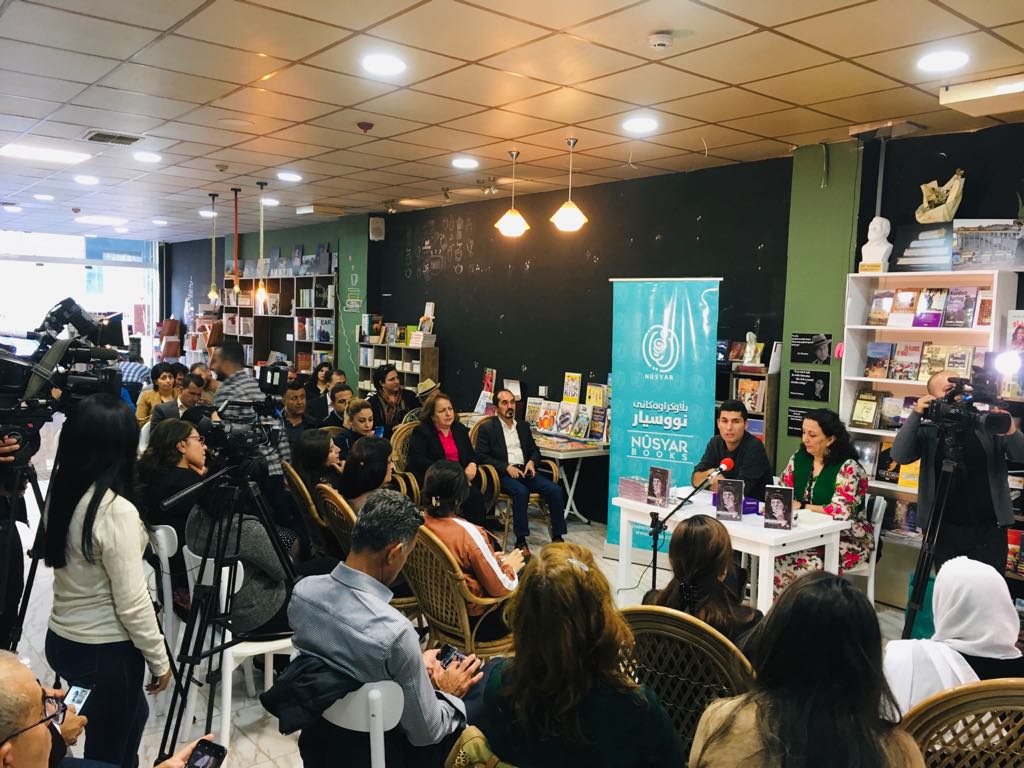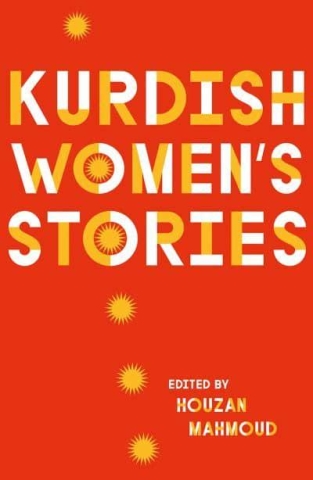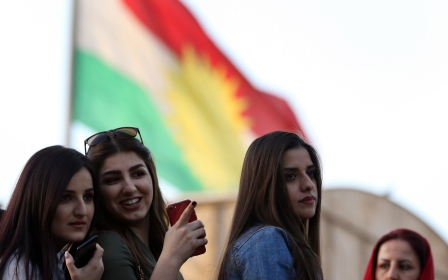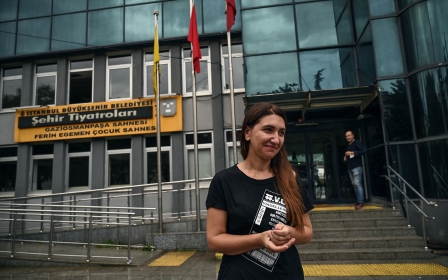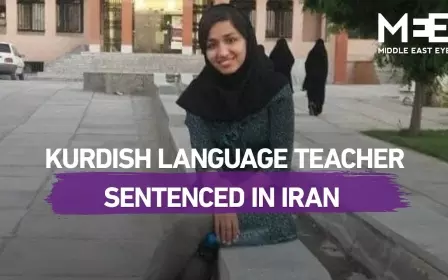Poets, fighters and dreamers: Kurdish women tell their own stories
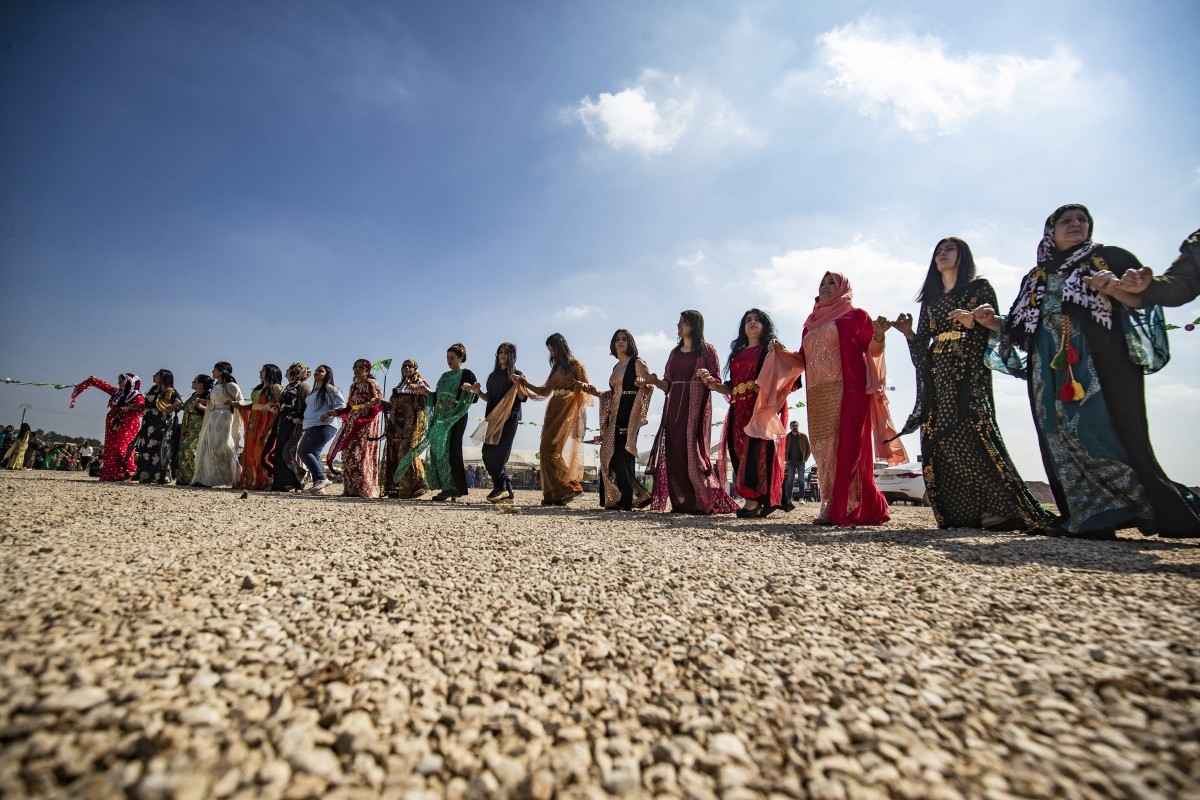
I said, ‘Listen, when I bring home Aram’s body, do not cry and beat yourselves because the security forces will be with us. And they will love to see that. Hold your heart, and do not let the enemy take any satisfaction of that kind.’ Quietly and calmly, we brought home my son’s body, and we did not let any of the Baathist murderers see our tears.
- Mother Sabria, born in 1950, Sulaymaniyah
Mother Sabria's 17-year-old son was arrested by Saddam Hussein’s security forces in 1988 for his association with groups conspiring against the regime. She says he was tortured and executed at Abu Ghraib prison.
Hers is just one of 24 harrowing stories in the anthology Kurdish Women’s Stories, released in English translation earlier this year.
New MEE newsletter: Jerusalem Dispatch
Sign up to get the latest insights and analysis on Israel-Palestine, alongside Turkey Unpacked and other MEE newsletters
It was late 2019 when the feminist activist and writer, and my Kurdish friend and colleague, Houzan Mahmoud, approached me to work with her on the English edition of the anthology. I had been collaborating with Mahmoud since 2017, contributing articles to and helping with Culture Project, a dual-language platform co-founded by her and dedicated to Kurdish artists, feminists and activists from the homeland and its diaspora.
After accepting her offer to work on this new collection, I spent the next few months immersing myself in the astounding stories of dozens of women, spanning several generations and hailing from all Kurdish regions and the Kurdish community throughout the world.
What I read was nothing short of remarkable, as I followed these extraordinary women who had braved unimaginable ordeals, from torture in prison cells to dire conditions in guerrilla camps.
Kobra Banehi, born in 1966 in Baneh, in Iran's Kurdish region (also known as Eastern Kurdistan), is one such woman. In her chapter, The Prison Speakers Played Islamic Verses, she recounts how she was imprisoned and tortured for her involvement with Komalah, a political party advocating for Kurdish self-determination.
“I was taken to a torture chamber in the basement,” Banehi narrates. “I could see chains hanging on the wall and a metal bed with a black top. The man told me: ‘I will make your life as black as the top of this bed.’” She refused to confess her guilt and “write that Komalah was a traitor of the people”.
Another is Nasrin Ramazanali, born in 1967 in Sanandaj, also in northwestern Iran's Kurdish region. In her chapter, Fighting an Islamic Regime, she writes:
When I turned seventeen, in 1983, a member of my resistance cell was captured. Fearing he would mention my name under torture, I fled into the mountains and joined the Peshmerga. I wore the kawa pantol, the traditional baggy overalls that male Peshmerga fighters wear. The only thing that made me stand out from the men was my long hair. I was given three months of training and my own Kalashnikov. From then on, my life became a perpetual march, from fight to fight.
Both women now live in Germany.
Confronting persecution
With events in recent history - including the fight against the Islamic State of Iraq and Syria and the revolution of Rojava - shining a spotlight on Kurdish women, “the female fighter image became an icon… [that] captivated people everywhere,” Mahmoud writes in the anthology encompassing 24 women’s stories, which she edited.
Conflict has long characterised the region; the women of Mahmoud’s own family were engaged in the armed struggle decades earlier against Saddam Hussein’s regime, and she “witnessed first-hand the great sacrifices” they made.
While similar accounts inevitably occupy much space in the anthology - from the brutality of the Turkish state to that of the Baath regimes in Syria and Iraq - Mahmoud is eager to offer readers “a glimpse into the colourful lives of Kurdish women”, going beyond typical media representations and official party narratives and highlighting instead the richness and diversity of experience in these women’s stories.
These women are poets, fighters, lovers and dreamers who have had to battle for access to some of life’s simplest pleasures and most fundamental rights.
One such woman is Hero Kurda, from Kirkuk, whose love for poetry and determination to become a poet remained unwavering in the face of displacement, death in her family and the daunting masculine presence in literature that led her to believe, as a child, that God had “specifically chosen” men to write poetry.
Equally poignant is the story of Shahla Yarhussein, who loved her fiance fiercely despite her fear of men and who incurred the wrath of her father for simply taking engagement photos. In the chapter, The Lost Photos of Engagement, she writes:
I would have loved to express to my fiance how in love I was with his beauty, his expressions and that I always longed to hear his voice and speak to him. All the more, I would have loved to tell him all the fears that were instilled in me as a child, about marriage and men, and how, as women, we were told to do as they say and take care of them.
Having been involved with Culture Project for several years, I was aware that characterising the lives of so many Kurdish women was a two-fold fight against political and sex-based persecution, and in this book as elsewhere, the two struggles are inextricable. The road to women’s liberation is one that they often pave and walk on alone; uncomfortable truths about the oppression they suffer at the hands of men from their own community can be alienating.
These women, however, unflinchingly recount the injustice they have endured in all its forms - whether inflicted by the state or by patriarchal society. In doing so, they directly challenge the erasure of Kurdish women’s lived experiences in the dominant narratives.
'Bookstores are full of such biographies written by men, often citing their bravery and the bygone days of heroism. In contrast, the stories of women … are missing or overshadowed by male "heroism"'
- Houzan Mahmoud, feminist activist and writer
“In recent years, many men in South Kurdistan (Iraq) who were politically active in Saddam’s era have written about their political struggles and imprisonment,” Mahmoud writes in her introduction to the book.
“Bookstores are full of such biographies written by men, often citing their bravery and the bygone days of heroism. In contrast, the stories of women, who were also combatants, who were imprisoned, who suffered and kept the momentum of political struggle in Kurdistan alive, are missing or overshadowed by male 'heroism'.
"Even where women’s stories are told, they are whitewashed by official party-owned publications and media made to revolve around those women who are close to the establishment, or who have high political or social status. The reason always goes back to the nature of political parties in South Kurdistan, which are mainly male-dominated.”
Kurdish Women’s Stories was thus born from this imperative to affirm the existence of women whose roles in Kurdish society were equally vital to their male counterparts but whose narratives were diminished or outright effaced by prevailing hierarchical structures. In January 2018, Mahmoud put out a call on Culture Project’s website, inviting Kurdish women to write about their lived experiences.
“We published a couple of stories, which really encouraged other women to come forward,” Mahmoud told me; so powerful was the need to share their experiences, that even women who were unable to read or write presented themselves as eager contributors, narrating their lives for writers such as Amira Mohammed, who “faithfully recorded their stories”, transcribing them as they were told by the women.
Fighting erasure
The collection was first published in the Sorani dialect by Denmark-based Kurdish publishing house Nusyar and launched in Sulaymaniyah in November 2019, with several of the contributors present. The English edition, originally supposed to come out in June 2020, was released in January of this year after a delay owing to the pandemic.
“It feels great to see the English book finally in print,” Mahmoud said. “I feel like I’ve accomplished something that should have been done long before, which is to have Kurdish women tell their own stories. This is not only a way to raise awareness about Kurdish women but also a way for them to assert agency and occupy a space in the realm of writing.”
Alan Pary, poet and owner of Nusyar Publishing, said: “Kurdish Women’s Stories has managed to occupy an important space in the minds of readers. The stories are written by the women themselves, and this is something unique and novel for Kurdish readers. The book has definitely left its impact on the publishing scene here.”
During the online launch hosted by Pluto Press last February, a contributor to Kurdish Women’s Stories, Ruken Isik - whose chapter recounts her experiences with identity, name change, student activism and imprisonment in Turkey's Kurdish region - spoke of the importance of “decolonising” and challenging the narratives that nation-states have imposed upon the Kurdish people.
“If we do not tell our stories, someone else will come and be the author,” she said.
A major current running through Isik’s story is that of erasure, of her own identity and of the Kurdish people in general.
“The officer insisted that [my name] was not Turkish, therefore my birth could not be registered. Worryingly, there were few options: either my parents forfeit the name and register me, or I would be unregistered with the name Ruken,” she writes.
Further along in the chapter, she recounts her experiences in college, when the Kurdish Student Movement, of which she was a part, petitioned that Kurdish be offered as an elective course at the university.
In what would amount to yet another instance of violent suppression and erasure of Kurdish culture at the hands of the state, the university criminalised the petition, and Isik was expelled and later imprisoned. She would eventually complete her education in the US and pursue a PhD in Kurdish women’s activism.
Vera Eccarius-Kelly, professor of political science and international relations at Siena College in Albany, New York, underlined the importance of elevating the voices of Kurdish women.
Eccarius-Kelly, whose research focuses on the Kurdish diaspora, said there was “hardly a mention in oral history projects”, remarking on the dearth of literature on Kurdish women’s lived experiences. “And, as far as I can tell,” she added, “historiography is devoid of Kurdish women’s voices.”
After conducting preliminary searches, she found some narratives present within the context of language, employment, sex-based violence and persecution and genocide. None of the above, however, were focused on individual Kurdish voices, further underscoring the significance of an anthology exclusively dedicated to amplifying these.
“This moving collection gives us a glimpse into Kurdish women’s struggles for survival,” said Dr Shilan Fuad, a researcher at the Geneva Centre for Security Policy, member of the Kurdish Women Studies Network, and cultural analyst specialising in Middle Eastern and Kurdish studies.
“The various testaments capture the harrowing fight to be seen and heard and to live as free women within a world set out to restrict their existence,” she told Middle East Eye.
'I can have my own voice'
Mahmoud is currently working on a second collection of stories and, in January of this year, launched a series of online sessions for Kurdish women from both within Kurdistan and throughout the diaspora. The sessions, held via Zoom, aim to educate on the different schools of thought within feminism and on women’s struggles worldwide. Over 25 women have thus far responded.
For many of the women featured in this anthology, a feminist consciousness was what allowed them to not only understand their oppression but to break through the stifling mould of patriarchal society, to survive, and to effect meaningful change.
“Feminism taught me to believe that I can be seen and I can be heard; I can have my own voice and my own worldview,” writes Khanda Hameed, born in 1988 in Ranya, northern Iraq. She is a researcher and coordinator of the Culture Project in Kurdistan.
In her chapter, A Handful of Blood, she relates her horrific experience as “one of the millions of girls who have fallen victim to [the] horrendous practice” of female genital mutilation.
“Feminism allowed me to express my pain in its own language… I want to tell my story about this unjust phenomenon in the hope that it will no longer affect girls and women… The first step in defying this reality is to speak about this crime.”
Like the other women in this anthology, Hameed has boldly taken that first step in defiance of a reality that has long suppressed stories like her own.
Middle East Eye delivers independent and unrivalled coverage and analysis of the Middle East, North Africa and beyond. To learn more about republishing this content and the associated fees, please fill out this form. More about MEE can be found here.


